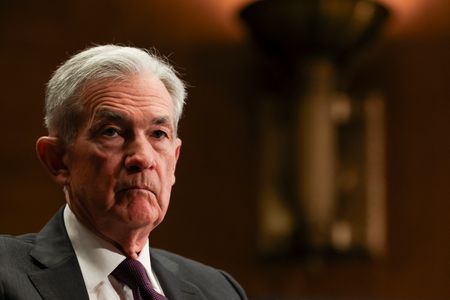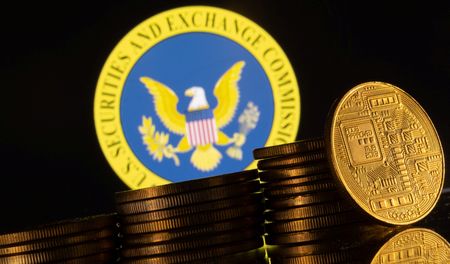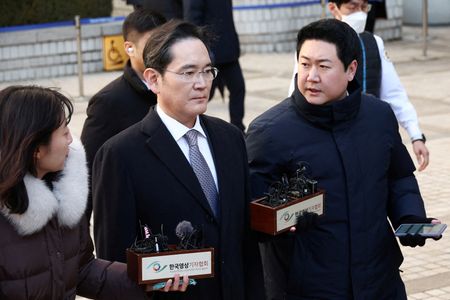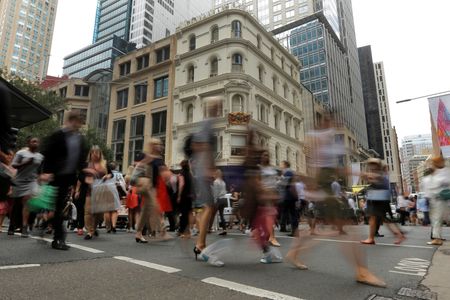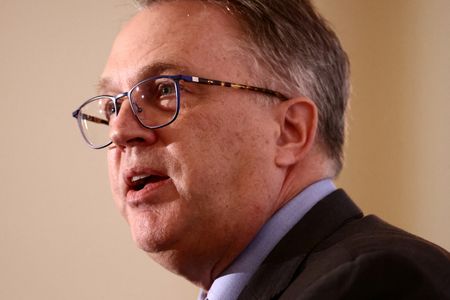By Trevor Hunnicutt
WASHINGTON (Reuters) -U.S. President Donald Trump said Wednesday he is not planning to fire Federal Reserve Chair Jerome Powell, but he kept the door open to the possibility and renewed his criticism of the central bank chief for not lowering interest rates.
A Bloomberg report earlier Wednesday saying that Trump was likely to fire Powell soon sparked a drop in stocks and the dollar, and a rise in Treasury yields.
Trump, who has been criticizing Powell on an almost daily basis for being “TOO LATE” to cut interest rates, said the report wasn’t true.
But Trump confirmed he had floated the idea with Republican lawmakers on Tuesday evening, marking the latest chapter in an escalating campaign by Trump against the independent central bank and its embattled chief.
“I don’t rule out anything, but I think it’s highly unlikely unless he has to leave for fraud,” Trump said, a reference to recent White House and Republican lawmaker criticism of cost overruns in the $2.5 billion renovation of the Fed’s historic headquarters in Washington.
There has been no evidence of fraud, and the Fed has pushed back on criticism of its handling of the project.
Powell, who was nominated by Trump during his first term in late 2017 to lead the Fed and then nominated for a second term by Democratic President Joe Biden four years later, has repeatedly said he intends to serve out his term, which runs through May 15, 2026.
A recent Supreme Court opinion has solidified a long-standing interpretation of the law that the Fed chair cannot be fired over policy differences but only “for cause.”
In an interview aired later on Wednesday, Trump was again asked if he was thinking of removing Powell.
“I’d love it if he wants to resign, that would be up to him,” Trump told the Real America’s Voice. “They say it would disrupt the market if I did.”
Treasury yields pared declines and stocks ended the day higher after Trump’s comments, which included the familiar complaint that Powell is a “terrible” chair for keeping the Fed’s short-term policy rate in the 4.25%-4.50% range since December while the central bank assesses the impact of sharply higher tariffs on inflation.
Trump blames the Fed for higher long-term rates that increase the cost of U.S.
government borrowing. His attacks on Powell have continued since his signing on July 4 of the “Big Beautiful Bill,” the tax and spending bill that independent analysts say will add trillions of dollars to the U.S.
deficit.
“A HUGE MISTAKE”
Republican Senator Thom Tillis of North Carolina, who opposed the tax bill and has since said he won’t run for reelection, on Wednesday delivered a spirited defense of an independent Fed, which economists say is the linchpin of U.S.
financial and price stability.
“There’s been some talk about potentially firing the Fed chair,” said Tillis, a member of the Senate Banking Committee, which oversees the Fed and confirms presidential nominations to its Board.
Subjecting the Fed to direct presidential control would be a “huge mistake,” he said.
“The consequences of firing a Fed chair, just because political people don’t agree with that economic decision, will be to undermine the credibility of the United States going forward, and I would argue if it happens you are going to see a pretty immediate response, and we’ve got to avoid that,” said Tillis.
Other Republicans downplayed the possibility of Trump’s firing Powell.
Asked if it would be a problem for Trump to fire Powell, Senate Majority Leader John Thune told reporters: “My understanding is he doesn’t have any intention of doing that.”
“President Trump’s own analysis and that of his Treasury secretary is that he cannot fire Jay Powell,” House Financial Services Committee Chair French Hill told CNBC earlier on Wednesday.
RENOVATIONS AT THE FED
Last week, the White House appeared to try to lay the groundwork for firing Powell for cause when the director of the Office of Management and Budget, Russell Vought, sent Powell a letter saying that Trump was “extremely troubled” by the renovations of two Fed buildings.
Powell responded by asking the U.S.
central bank’s inspector general to review the project. The central bank also posted a “frequently asked questions” fact sheet, which rebutted some of Vought’s assertions about VIP dining rooms and elevators that he said added to the costs.
“Nobody is fooled by President Trump and Republicans’ sudden interest in building renovations — it’s clear pretext to fire Fed Chair Powell,” Elizabeth Warren, the top Democrat on the Senate Banking Committee and herself a longtime critic of Powell, posted on X.
Warren was the committee’s only member to vote against Powell’s renomination as chair in 2022, saying he had not done enough on regulation.
Fed policymakers are worried that, with 40-year-high inflation only recently in the rear-view mirror, any bump up in inflation coupled with a too-early cut to short-term borrowing costs could ignite expectations that inflation is back, a potentially self-fulfilling prophecy that could weaken the economy and undermine progress on price stability.
Analysts said they feared the pressure campaign on Powell would continue — with deleterious effects on the Fed’s ability to do its congressionally mandated job of both keeping prices stable and maximizing employment.
“Any reduction in the independence of the Fed would likely add upside risks to an inflation outlook that is already subject to upward pressures from tariffs and somewhat elevated inflation expectations,” wrote JP Morgan chief U.S.
economist Michael Feroli, who said he doubts the “saga” of the president’s repeated threats to remove Powell is over.
Feroli and others noted that continued pressure on Powell would likely push up longer-term interest rates as investors demand more protection from the risk of higher inflation — making U.S.
government borrowing more, not less, expensive.
The “formal process” for identifying a successor to Powell is under way, Treasury Secretary Scott Bessent has said. Bessent is one candidate for the job, along with White House economic adviser Kevin Hassett, former Fed Governor Kevin Warsh and Fed Governor Christopher Waller.
(Reporting by Ryan Patrick Jones in Toronto, David Morgan, Trevor Hunnicutt, Andrea Shalal, Howard Schneider, Jasper Ward and Kanishka Singh in Washington; writing by Ann Saphir; editing by Rami Ayyub, Nick Zieminski and Leslie Adler)

